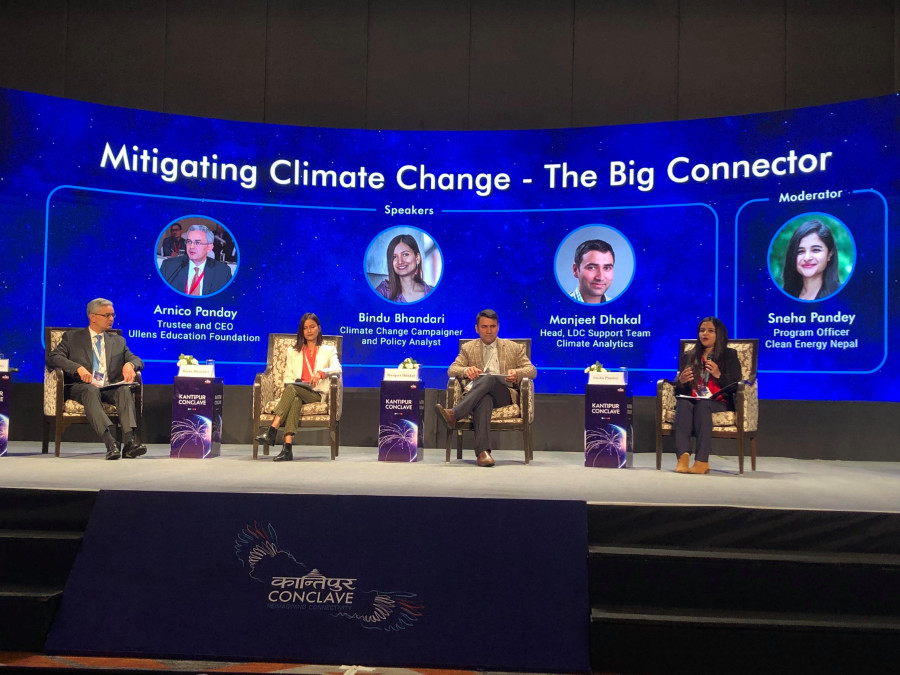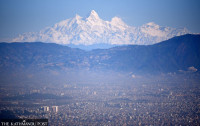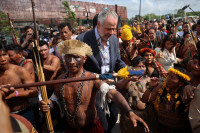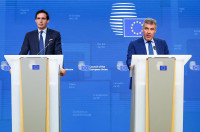Climate & Environment
Kantipur Conclave panelists call for a shift in Nepal’s approach to climate change
It needs to let go of the ‘victim mentality’ and call out states responsible for carbon emissions, panelists said.
Chandan Kumar Mandal
Nepal needs to change its approach towards the issue of climate change, panelists at the “Mitigating Climate Change-The Big Connector” session on the second day of the Kantipur Conclave said.
Nepal should let go of its narrative that it is only at the receiving end of the impacts of climate change, call out countries aggravating the problem and mobilise the youth to share knowledge with vulnerable communities.
Panelists for the session moderated by Sneha Pandey, program officer at Clean Energy Nepal, were: Arnico Panday, trustee and interim CEO, Ullens Education Foundation; Bindu Bhandari, climate change campaigner and policy analyst and Manjeet Dhakal, head of Least Developed Countries Support Team at Climate Analytics.
“We need to change the victim narrative that we are a vulnerable and poor country, and take proactive leadership to help the world find a solution [to the problem],” said Dhakal. He also added that the government's approach of seeking immediate solutions to the problem is not going to help when it comes to issues related to climate change. “We also need to let go of the mindset that the issue of climate change is only for receiving funds [from abroad],” he added.
Various Intergovernmental Panel on Climate Change (IPCC) reports published in the last two decades paint an alarming picture of the growing impacts of climate change, said Pandey, an atmospheric scientist. “Understanding of climate change is not new. It has been known for a long time that burning fossil fuels and emitting greenhouse gases will warm the atmosphere,” said Arnico Pandey.
The 2018 IPCC report, prepared to provide the science needed to meet the global commitments laid out in the historic Paris Agreement to limit temperature rise to 1.5 °C above pre-industrial levels, said that global temperatures will likely rise to 1.5 °C above pre-industrial levels between 2030 and 2052 if warming continues to increase at the current rate. The assessments say that countries such as Nepal, face the brunt of climate change more due to its poor resilience capacity.
“Various things have been agreed too at the global level [in the context of climate change], but it is now the time to act. The long-term vision is to limit temperature rise to 1.5 degrees,” said Dhakal, who has been closely observing climate change negotiations. “To do that, we cannot wait till the end of this century. Every year from now, up to 2030, emissions have to be reduced by 7.6 percent.”
Pandey, meanwhile, said that to change its approach to the issue, Nepal should start by setting examples.“One is to set examples, we are more agile and can do more than the big countries in the fight against climate change,” said Pandey. “Second, we need to have a louder voice in calling out nations contributing to climate change. There is no time to be polite.”
Campaigner Bhandari said that youngsters need to be equipped with the latest technology to share knowledge related to the various facets of climate change with the most vulnerable communities. “With all the knowledge we have on climate, we need to translate them into the accessible language. And we can use digital technology including social media to convey the messages,” she added.




 9.89°C Kathmandu
9.89°C Kathmandu










